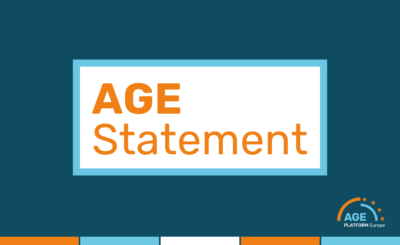PRESS RELEASE
Brussels, 7 December 2010
INCLUSage Seminar on Debating Older People’s Needs to mark the European Year 2010, 7 December 2010
Do policy makers really know what an adequate income to live in dignity mean for older people?
“Ensuring adequate retirement income is the purpose of all pension systems across the EU. Yet millions of older people have to cope with very low pensions that do not enable them to live a decent life”, said Anne-Sophie Parent, AGE Secretary General at the opening of a seminar AGE organised on 7 December with the support of the Committee of Regions and the European Parliament’s Intergroup on Ageing and Intergenerational Solidarity on ‘Promoting Adequate Income and Dignity in Old Age through Civil Dialogue’. This is the case of many pensioners whose purchasing power has been eroded over time by the lack of indexation of their pensions and higher health and energy costs. Some groups, such as older women, single older persons, older migrants or disabled older people are in a particularly precarious position as they face multiple disadvantages in building an adequate old-age income. “For all those vulnerable older people, adequate pension and social protection provided by the state is necessary as a safety net; and we remind policy makers that the right to the sufficient resources to live in dignity is a fundamental right everyone is supposed to enjoy in the EU, including older people”, added Mrs Parent
Important reforms are being introduced everywhere in the Europe to limit the impact of pensions on public spending. “To ensure a decent life to all, minimum income schemes and pension provisions must compensate for all the needs older people have, i.e. access to quality health, long-term care and domestic services, decent and affordable housing, safe transport, lifelong learning, social and civic participation. Such schemes should take into account whether or not these services are provided free, at reduced cost or at full price”, stressed Kartika Liotard, MEP and Co-President of the Intergroup on Ageing and Intergenerational Solidarity.
Most national policy makers do not seem to take this broader perspective when reforming their social protection systems and are only concerned about their financial sustainability. Yet local authorities have understood that “…establishing a regular dialogue with older people and their organisations, through formal consultation frameworks or participative initiatives at local level, can reinforce democracy and should be promoted as a way to build better responses to citizens’ needs and to develop public support for those difficult reforms”, reminded Arnoldas Abramavicius, President of the Committee of Regions’ Commission for Economic and Social Policy
With the support of the PROGRESS programme, a group of partners led by AGE has developed a methodology “Promoting Older People’s Social Inclusion through Civil Dialogue” with examples of good practices of consultation frameworks set up in seven partner countries to involve older people experiencing poverty and/or social exclusion in debates on social policies. The methodology should be used by older people’s organisations and public authorities at all levels to develop a better understanding of what older people need to live in dignity and how to ensure that everyone has access to the necessary resources.
END
****************
The seminar ‘Promoting Adequate Income and Dignity in Old Age through Civil Dialogue’is part of a series of initiatives developed by civil society actors in the context of theEuropean Year 2010.
EU action has helped to create a consensus about the following key challenges:
– to eradicate child poverty by breaking the vicious circle of intergenerational inheritance
– to promote the active inclusion in the society and the labour market of the most vulnerable groups
– to ensure decent housing for everyone
– to overcome discrimination and increase the integration of people with disabilities, ethnic minorities and immigrants and other vulnerable groups
– to tackle financial exclusion and over indebtedness
The EY2010 aims at raising awareness on poverty and social exclusion and calling to action. It is implemented in 29 European countries. To find out more, visit the EY2010 campaign website: www.2010againstpoverty.eu
This event is being organised by one of European Commission’s partners for the campaign. Yet the views expressed during the event do not necessarily reflect those of the European Commission.
******************






